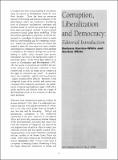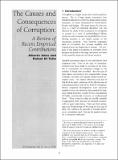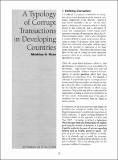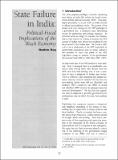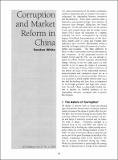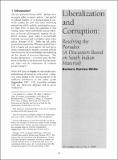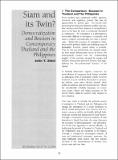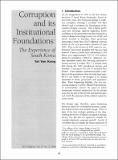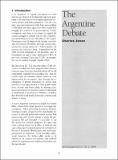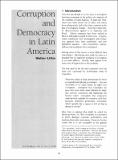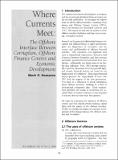Volume 27, Issue 2: Liberalization and the New Corruption?
Browse by
Recent Submissions
-
Corruption, Liberalization and Democracy: Editorial Introduction
(Institute of Development Studies, 01/04/1996) -
The Causes and Consequences of Corruption: A Review of Recent Empirical Contributions
(Institute of Development Studies, 01/04/1996)Summary This article presents a review of recent developments in the empirical literature on corruption which uses subjective indices and survey data. The results are presented on two broad themes: contributions to ... -
A Typology of Corrupt Transactions in Developing Countries
(Institute of Development Studies, 01/04/1996)Summary Economic theory has attempted to identify the conditions under which corruption has particularly harmful effects. This article evaluates these theories and argues that the classifications offered are misleading. ... -
State Failure in India: Political?Fiscal Implications of the Black Economy
(Institute of Development Studies, 01/04/1996)Summary The underground or ‘black economy’ has been a source of considerable concern to Indian public policy analysts since the mid 1960s. In this article we argue that the black economy played a critical role in the ... -
Corruption and Market Reform in China
(Institute of Development Studies, 01/04/1996)Summary Corruption in China, in various forms, has expanded along with and as a consequence of market reforms. Rent?seeking explanations are insufficient in explaining this link, which must also consider changes in the ... -
Liberalization and Corruption: Resolving the Paradox (A Discussion Based on South Indian Material)
(Institute of Development Studies, 01/04/1996)Summary Theoretical treatments of corruption in the new political economy place bureaucrats who control public sector goods centre stage. Corrupt behaviour then involves the creation of new private property rights over ... -
Siam and its Twin?: Democratization and Bossism in Contemporary Thailand and the Philippines
(Institute of Development Studies, 01/04/1996)Summary Any understanding of corruption in Thailand and the Philippines must rest upon a broader analysis of the phenomenon of ‘bossism’ in numerous localities in these two countries. The common manifestations of bossism ... -
Corruption and its Institutional Foundations: The Experience of South Korea
(Institute of Development Studies, 01/04/1996)Summary In spite of the reformist rhetoric of South Korea's first post?military administration inaugurated in 1993, the institutional foundations of corruption remain intact ? the government?big business relationship in ... -
The Argentine Debate
(Institute of Development Studies, 01/04/1996)Summary The catastrophic consequences of misgovernment and corruption experienced by Argentina and Brazil in the 1980s are contrasted with the subsequent achievements of reforming administrations. The brake of persistent ... -
Corruption and Democracy in Latin America
(Institute of Development Studies, 01/04/1996)Summary This essay examines the recent incidence of corruption as an issue in Latin American politics. It suggests that the process of democratization may have made corruption more pronounced. It concludes that Latin ... -
Where Currents Meet: The Offshore Interface Between Corruption, Offshore Finance Centres and Economic Development
(Institute of Development Studies, 01/04/1996)Summary The connections between economic development, corruption and the increasingly globalized financial system are not yet fully understood. In this article we examine tax havens and Offshore Finance Centres (OFCs) ...

